#asia pacific economic cooperation
Text
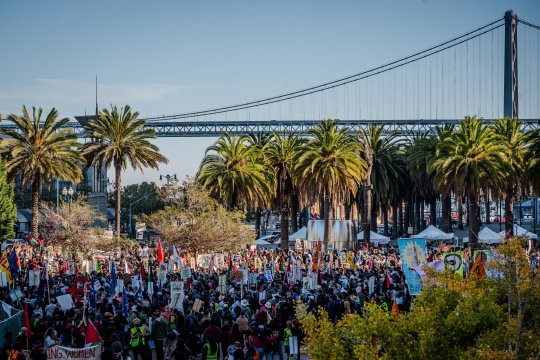
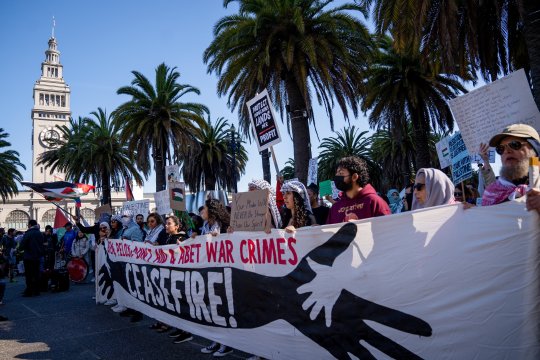
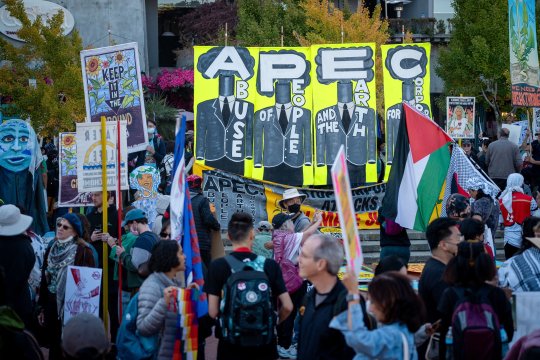
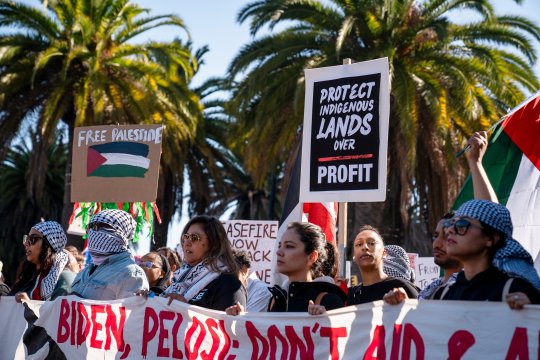
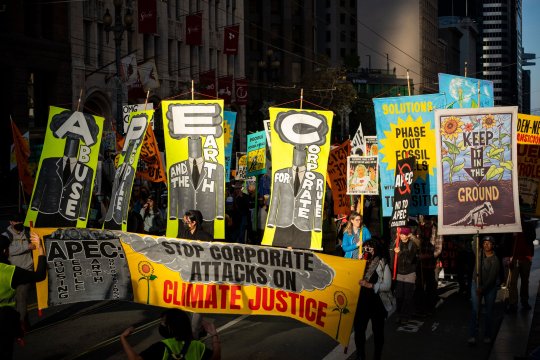
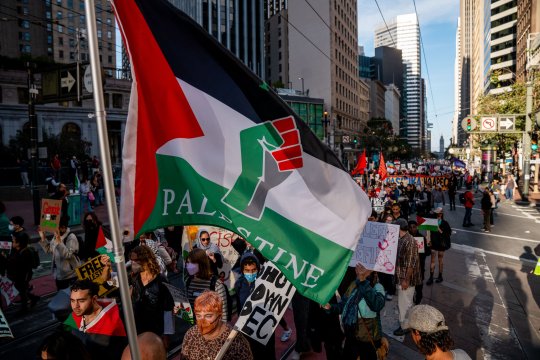

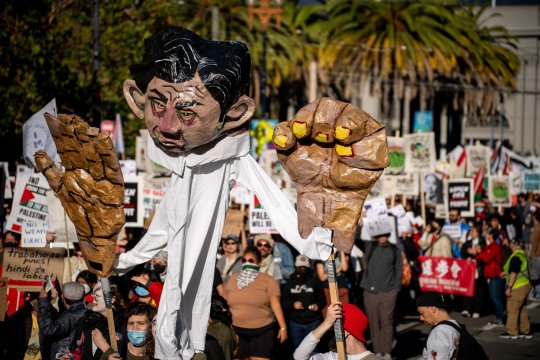
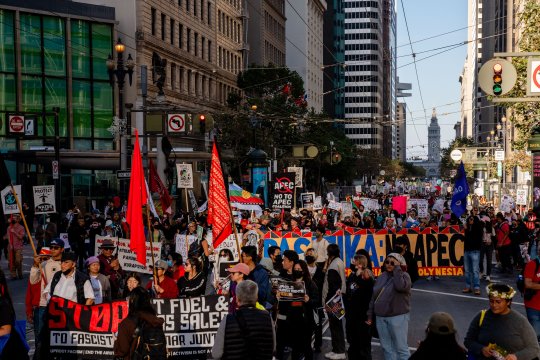

San Francisco ... thousands protesting #APEC2023 and demanding #CeasefireNOW in joint pro-Palestine action, many groups in solidarity of collective struggles
-- renepakmorrison, 12 Nov 2023
From the No 2 Asia-Pacific Economic Cooperation (APEC) campaign IG, "From Nov. 12th to Nov. 17th in San Francisco, CA, 21 heads of state, over 1200 CEOs of global corporations, and thousands of corporate lobbyists, government officials and “free trade” delegates will come to the Asia Pacific Economic Cooperation’s Summit to further their drive for profits, and their control over our political, economic, and cultural life, as well as the rapidly deteriorating climate.
Thousands will descend on the San Francisco Bay Area in a mass of community, creativity, and resistance to demonstrate what's possible in the face of poverty, human rights abuses and the climate crisis. There will be a week of action beginning with the Peoples’ Counter Summit on Nov. 11th, then the November 12th Mass Mobilization, a variety of actions around the Bay Area and a mass direct action at APEC’s CEO summit on Nov. 15th."
For more information about No 2 APEC and the impact of APEC on workers, students, and colonized people everywhere, check out the campaign linktree.
#no 2 apec#asia pacific economic cooperation#san francisco#california#anti capitalism#neoliberalism#imperialism#climate justice#palestine
10 notes
·
View notes
Text
Further reading:
HKFP: Hong Kong security chief slams Wall St Journal criticism of int’l arrest warrants, as Interpol say no ‘Red Notice’ received, July 5, 2023
#hong kong#hong kong national security law#Ted Hui#Dennis Kwok#Nathan Law#Anna Kwok#Elmer Yuen#Mung Siu Tat#Finn Lau#Kevin Yam#Security Bureak#Chris Tang#Interpol#politics#universal declaration of human rights#John Lee#news#hong kong free press#China#Asia Pacific Economic Cooperation
0 notes
Text
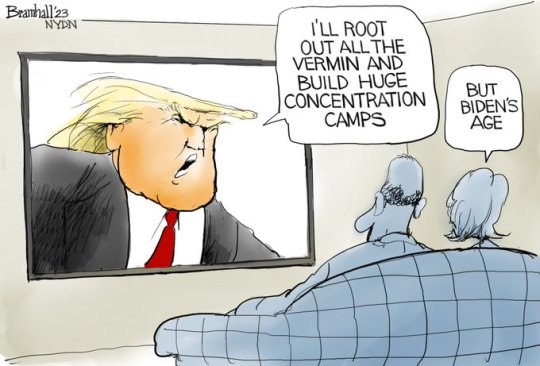
LETTERS FROM AN AMERICAN
November 16, 2023
HEATHER COX RICHARDSON
NOV 17, 2023
The summit of the leaders of the Asia-Pacific Economic Cooperation (APEC) economies continued today in San Francisco, California.
Formed in 1989, APEC is made up of the economies of 21 nations around the Pacific Rim: Australia, Brunei, Canada, Indonesia, Japan, South Korea, Malaysia, New Zealand, Philippines, Singapore, Thailand, Taiwan, Hong Kong, China, Mexico, Papua New Guinea, Chile, Peru, Russia, Vietnam, and the United States. Together, these economies make up about 62% of global gross domestic product and almost half of global trade.
David Sanger of the New York Times today noted an apparent shift in the power dynamic between President Joe Biden and Chinese president Xi Jinping, who met yesterday for a four-hour conversation. Earlier in his presidency, Xi was riding on a strong economy that overshadowed that of the U.S. and looked as if it would continue to do so. Then, Xi favored what was known as “wolf warrior” diplomacy: the aggressive defense of China’s national interests against what Chinese envoys portrayed as foreign hostility, especially that of the U.S.
Under that diplomatic regime, Xi emphasized that liberal democracy was too weak to face the twenty-first century. The speed and momentous questions of the new era called for strong leaders, he said. In early February 2022, Russia and China held a summit after which they pledged that the “[f]riendship between the two States has no limits.”
Things have changed.
The U.S. has emerged from the coronavirus pandemic with a historically strong economy, while China’s economy is reeling from a real estate bubble and deflation at the same time that government crackdowns have made foreign capital flee. This summer, Xi quietly sidelined Qin Gang, the foreign minister associated with wolf warrior diplomacy, and in October, he replaced Defense Minister General Li Shangfu, who is under U.S. sanctions for overseeing weapon purchases from Russia.
Indeed, China has also been quietly pushing back from its close embrace of Russia. Just weeks after their February 2022 declaration, Russia invaded Ukraine in an operation that Russian president Vladimir Putin almost certainly expected would be quick and successful, permitting Russia to seize key Ukrainian ports and land. Such a victory would have strengthened both Russia and China at the same time it weakened Europe, the United States, and their allies and partners.
Instead, Ukraine stood firm, and the North Atlantic Treaty Organization (NATO) and allies and partners have stood behind the embattled country. As the war has stretched on, sanctions have cut into the Russian economy and Putin has had to cede power to Xi, accepting the Chinese yuan in exchange for Russian commodities, for example. This week, Alberto Nardelli of Bloomberg reported that the European Union is considering another round of sanctions, including a ban on the export of machine tools and machinery parts that enable Russia to make ammunition.
In a piece at the Center for European Policy Analysis today, Julia Davis, who monitors Russian media, noted that Russia lost an extraordinary 997,000 people between October 2020 and September 2021, even before the war began. Now it is so desperate to increase its population that its leadership claims to have stolen as many as 700,000 Ukrainian children and is urging women to have as many children as possible.
Holly Ellyatt of CNBC noted that to the degree they even mentioned it, Russian media sniped at the Biden-Xi summit, but it was hard to miss that although Russian president Putin was not welcome to attend, Xi came and engaged in several high-level meetings, assuring potential investors that China wants to be friends with the U.S. Also hard to miss was Xi’s pointed comment that the China-U.S. relationship “is the most important bilateral relationship in the world.”
Going into this summit, then, the U.S. had the leverage to get agreements from China to crack down on the precursor chemicals that Chinese producers have been shipping to Latin America to make illegal fentanyl, restore military communications between the two countries now that Li has been replaced, and make promises about addressing climate change. Other large issues of trade and the independence of Taiwan will not be resolved so easily.
Still, it was a high point for President Biden, whose economic policies and careful investment in diplomatic alliances have helped to shift the power dynamic between the U.S. and two countries that were key geopolitical rivals when he took office. Now, both the U.S. and China appear to be making an effort to move forward on better terms. Indeed, Chinese media has shifted its tone about the U.S. and the APEC summit so quickly readers have expressed surprise.
Today, Biden emphasized “the unlimited potential of our partnerships…to realize a future that will benefit people not only in the Asia-Pacific region but the whole world,… [a] future where our prosperity is shared and is inclusive, where workers are empowered and their rights are respected, where our economies are sustainable and resilient.”
Biden and administration officials noted that companies from across the Asia-Pacific world have invested nearly $200 billion in the U.S. since Biden took office, creating tens of thousands of good jobs, while the U.S. has elevated its engagement with the region, holding bilateral talks, creating new initiatives and deepening economic partnerships.
Today, Biden and Commerce Secretary Gina Raimondo announced that the Indo-Pacific Economic Framework, an economic forum established last year as a nonbinding replacement for the Trans-Pacific Partnership former president Trump abruptly pulled out of, had agreed on terms to set up an early warning system for disruptions to supply chains, cooperation on clean energy, and fighting corruption and tax evasion.
In a very different event in San Francisco today, a federal jury convicted David DePape, 43, of attempted kidnapping and assault on account of a federal official’s performance of official duties for his attack on former House Speaker Nancy Pelosi’s husband Paul with a hammer on October 28 of last year, fracturing his skull.
DePape’s lawyers did not contest the extensive evidence against him but tried to convince the jury that DePape did not commit a federal crime because he did not attack Pelosi on account of Representative Pelosi’s official position. Instead, they said, DePape had embraced the language of right-wing lawmakers and pundits and believed in a conspiracy theory that pedophile elites had taken over the country and were spreading lies about former president Donald Trump.
DePape told jurors he had come to conspiracy theories through Gamergate, a 2014–2015 misogynistic online campaign of harassment against women in the video game industry, which turned into attacks on feminism, diversity, and progressive ideas. Trump ally Steve Bannon talked of pulling together the Gamergate participants behind Trump and his politics.
Also today, a subcommittee of the House Ethics Committee set up to investigate allegations against Representative George Santos (R-NY) issued its report. The Republican-dominated committee found that Santos had lied about his background during his campaign and, furthermore, that he appears to be a serial liar. Those lies also “include numerous misrepresentations to the government and the public about his and his campaign’s financial activities.”
That is, the committee found, Santos defrauded his campaign donors, falsified his financial records, and used campaign money on beauty products, rent, luxury items from Hermes and Ferragamo, and purchases at the website Only Fans. The subcommittee recommended the Ethics Committee refer Santos to the Department of Justice, and “publicly condemn Representative Santos, whose conduct [is] beneath the dignity of the office” and who has “brought severe discredit upon the House.”
Santos says he will not run for reelection.
—
LETTERS FROM AN AMERICAN
HEATHER COX RICHARDSON
#Letters From An American#Heather Cox Richardson#Ethics#Santos#Xi#China US relations#Asia-Pacific Economic Cooperation (APEC)#gamergate#Pelosi
5 notes
·
View notes
Text
IL CANDIDATO CINESE, PRESIDENTE DELL'EWG DELL'APEC 2025-2026
2024-08-17 17:54:50
Al 68esimo incontro del gruppo di lavoro sull’energia (EWG) dell’APEC appena concluso, il candidato cinese è stato eletto Presidente del gruppo di lavoro sull’energia dell’APEC per il 2025-2026.
Mirando agli obiettivi di “dual carbon” (raggiungimento del picco delle emissioni di anidride carbonica prima del 2030 e neutralità carbonica prima del 2060) la Cina sta accelerando…
#acqua#Agricoltura#ambiente#Asia-Pacific Economic Cooperation#cooperazione#ecologia#Environmental Working Group#inquinamento
0 notes
Text
youtube
#youtube#news#Security Cooperation#Defense Cooperation#Major Announcements#Strategic Partnerships.#Economic Partnerships#Regional Stability#Antony Blinken#Lloyd Austin#Bilateral Talks#Asia Pacific#United States#Philippines#International Relations#Foreign Policy#Manila#Diplomacy#Foreign Affairs#US Philippines Relations#Military Alliances#Partnerships#State Department#Manila press conference#Secretary of State#Joint press conference#Manila presser#Press briefing#Politics#International relations
0 notes
Text
ILO and UNTFSSE celebrate first anniversary of UNGA Resolution on the SSE with a global webinar.

youtube
On Thursday, April 18, 2024, the International Labour Organization (ILO) and the UN Inter-Agency Task Force on Social and Solidarity Economy (UNTFSSE) hosted an anniversary webinar. The event featured regional updates and reflections on the progress since last year’s adoption of the UN General Assembly (UNGA) Resolution promoting the Social and Solidarity Economy (SSE) for sustainable development. The webinar attracted nearly 400 registrants from 65 countries. Accessibility in French, English, and Spanish ensured inclusivity for a diverse audience.
A Year of Global Progress
The event kicked off with a welcome statement from Ms Simel Esim, Head of Cooperative, Social and Solidarity Economy at the ILO and Co-Chair of the UNTFSSE. “Each region brings its unique insights and challenges, enriching our dialogue and enhancing our understanding of how to effectively promote sustainable development across different contexts,” Ms Esim stated. Noting the ILO's role as a co-founder and leader of the Task Force for most of the past decade, she underscored the past year's key achievements for the UNTFSSE and the ILO in follow-up to the ILC resolution concerning decent work and the SSE. She notably highlighted the online self-learning modules for awareness raising on the SSE, developed for the UNTFSSE by the ILO and its International Training Centre in Turin, with support from the Government of Luxembourg.
Ms Chantal Line Carpentier, Head of Trade, Environment, Climate Change, and Sustainable Development at UN Trade and Development and Co-Chair of the UNTFSSE, presented a summary of the UNTFSSE’s Strategic Action Plan for 2024-2026. She noted that the plan prioritizes implementing the UNGA resolution, preparing the UN Secretary General’s report, institutionalizing Task Force governance, and promoting key areas such as policy coherence, education and research, access to financial and non-financial support services, and statistics. Linking the SSE to a new economics for sustainable development she noted: “We see a lot of regional progress, and we need to make sure it goes global, and it goes national, and it goes local. And all of this we can do with our partners at all the levels, but it will require some resources.”
Regional Level Highlights
The webinar showcased updates from various regions, beginning with two video messages from Spain and Chile, two co-sponsors of the UNGA resolution, that highlighted the launch of the Ibero-American Network for the Promotion of the SSE. On the Iberian side, Ms Amparo Merino, Secretary of State for the Social Economy from Spain’s Ministry of Labour and Social Economy, praised the resolution as “a true example of international cooperation in these times in which conflict and international disorder seem to prevail.” On the Americas side, Ms Claudia Fuentes Julio, Permanent Representative of Chile to the United Nations Office at Geneva, stated: "Our commitment to social justice is at the heart of our efforts to promote the SSE. This dedication transcends borders as demonstrated by the participation of more than a dozen governments of the Americas in the ILO Global Coalition for Social Justice."
Following these two video messages, Mr Patrick Klein, Head of Sector for Social Economy and Social Enterprise, and Ms Margit Perko, Policy Officer at the Directorate-General for Employment, Social Affairs and Inclusion, both representatives of the European Commission, discussed the implementation of the Social Economy Action Plan. Mr Klein underlined the importance of supporting “social economy actors to be a beacon in … the green transition [and] the digital transition." Ms Perko presented highlights of progress, such as the adoption of the Council Recommendation on developing social economy framework conditions and the launch of the EU Social Economy Gateway.
Participants then heard from Mr Sabelo Mbokazi, Head of Labour, Employment, and Migration Division at the African Union (AU) Commission. He discussed the AU’s engagement with the SSE, including the development, with ILO support, of a ten-year SSE Strategy and mapping studies to inform policy making. The strategy is set to be endorsed by Ministers responsible for Social Development, Labour, and Employment at the end of July in 2024. “The strides made so far,” he noted, “stand as a testament to the transformative potential of SSE in advancing socio-economic progress across the Continent.”
And lastly, Mr Denison Jayasooria, Former Chair of the Asian Solidarity Economy Council (ASEC) and Head of Secretariat, All Party Parliamentary Group Malaysia on SDGs, shared the perspective of SSE actors in Asia and the Pacific, in the absence of an intergovernmental regional initiative on the SSE. Mr Jayasooria emphasized the vibrancy of the SSE movement in the region as “an alternative model of doing business and development … towards a more sustainable, inclusive, and just development.” Discussing the policy situation, he underscored the need to build on the multi-country research initiative with the ILO.
Participant Reflections & Re-Commitment
The presentations sparked a period of reflection among designated participants, including representatives from the Ministry of Microfinance and the Social and Solidarity Economy of the Government of Senegal, which co-sponsored the UNGA resolution, the Organisation for Economic Co-operation and Development, Global Social Economy Forum and SSE International Forum. Joining the ILO’s Global Social Justice Coalition was emphasized as a key opportunity to promote the SSE. Looking ahead, upcoming milestones include the UN Summit of the Future, the Second World Summit for Social Development, and the second UN International Year of Cooperatives in 2025.
A video recording of the event is available here.
#UNTFSSE#webinar#socio-economic progress#Social Economy Action Plan#contribute to a greener planet#green transition#cooperative economy#Social and Solidarity Economy (sse)#asia pacific#ilo asia pacific#Youtube
0 notes
Text
America-Philippines nuclear deal opens opportunities for investments and energy
Recently a landmark deal about nuclear power for peaceful purposes was signed between the United States of America and the Philippines which opens up opportunities for investments and energy that the Filipino people can benefit from, according to separate news stories (click here and here) published by the Philippine News Agency (PNA).
To put things into perspective, posted below is an excerpt…

View On WordPress
#123 Agreement#abundant energy#abundant power#America#Antony Blinken#Asia#Asia-Pacific Economic Cooperation (APEC)#BBM#Blog#blogger#blogging#business#Carlo Carrasco#clean#clean energy#economics#economy#energy#Ferdinand Marcos#geek#governance#government#investment#investments#Kamala Harris#Marcos#micro modular reactor (MMR)#modernization#news#nuclear energy
0 notes
Text
Investment Pledges to Malaysia after the Asia Pacific Economic Forum (APEC) reached Usd 13 billion while the Philippines could only claim Usd 672 million from the same Forum. Why are US Companies “Pledging” more to China’s close Ally Malaysia than to the supposed Ally of the US, the Philippines?
#philippines#malaysia#asia pacific economic corridor apec#united states us#anwar ibrahim#bong bong marcos bbm#abbott laboratories#mondelez international#amsted rail#hematogenix#perkinelmer#ford motor company#boeing#amazon web services#enovix#lam research#google#enovix cooperation#microsoft#tiktok#tpg incorporated
1 note
·
View note
Link
Japan and China on Tuesday made their first call on a new military hotline after years of negotiations to set up the communication channel. As per a report by AFP, the development was confirmed by the defence ministries of both countries. Japanese Defence Minister Yasukazu Hamada, in a statement, said that he held a conversation for 20 minutes with his Chinese counterpart Li Shangfu, the news agency reported.
"Hamada mentioned the existence of security concerns between Japan and China, such as the situation in the East China Sea," it said.
He "stated that it is necessary to have candid communication especially when there are concerns about Japan-China relations".
The call was confirmed by Beijing, too, saying the air and maritime hotline would "contribute to further maintaining regional peace and stability".
The hotline was launched on March 31 this year and had been mooted by both sides for over a decade as a way to avert unexpected clashes in the East China Sea.
Tensions between the two East Asian countries had been simmering over a territorial dispute on islets in the area known as the Senkaku by Tokyo and the Diaoyu by Beijing.
This development comes just a week before Japan is scheduled to host the G7 summit to be attended by US President Joe Biden where the bloc’s relationship with China will be high on the agenda. US and Japan will also be attending the Quad meeting along with Australia and India on May 24 which hovers around China’s growing aggression in the region.
Wary of its neighbour's growing military power, Japan has publicly protested the presence of Chinese vessels around the disputed islets, and in other regions including near Okinawa.
World’s second and third largest economies, China and Japan are also key trading partners and last year marked the 50 years of diplomatic ties.
But ties between them are often fraught, and soured in December when Japan announced a security overhaul including more defence spending, calling China its "greatest strategic challenge ever".
However, PM Kishida recently said he wanted “constructive and stable” ties with Beijing.
Kishida and Chinese President Xi Jinping also held a meeting last year on the sidelines of the Asia-Pacific Economic Cooperation (APEC) summit.
#apec#asia-pacific economic cooperation#neoliberalism#china#japan#fumio kishida#xi jinping#japanese government#yasukaza hamada#li shangfu#inter-imperialism#imperialism#military#politics
0 notes
Text
Asia must not become arena for 'big power contest,' says China's Xi as APEC summit gets underway | CNN
Asia must not become arena for ‘big power contest,’ says China’s Xi as APEC summit gets underway | CNN
Bangkok, Thailand
CNN
—
Chinese leader Xi Jinping has stressed the need to reject confrontation in Asia, warning against the risk of cold war tensions, as leaders gather for the last of three world summits hosted in the region this month.
Xi began the Asia-Pacific Economic Cooperation (APEC) leaders’ summit in Bangkok by staking out his wish for China to be viewed as a driver of regional…
View On WordPress
#2020 presidential election#ASEAN#asia#asia-pacific economic cooperation#Bangkok#China#conferences and conventions#conflicts and war#continents and regions#diplomatic talks and summits#east asia#eastern europe#elections (by type)#elections and campaigns#europe#g20 summits#government and public administration#government bodies and offices#government organizations - intl#inter-governmental talks#International relations#international relations and national security#joe biden#military#military weapons#missile systems#north america#North Korea#north korea nuclear development#nuclear weapons
0 notes
Text




Rosé speaking about mental health at the Asia-Pacific Economic Cooperation event in San Francisco
61 notes
·
View notes
Text
They won’t do this for the people who pay taxes and live in the city, but they’ll do it for Xi. This sends a very clear message about who the leaders of the city care about and it’s not the Americans who live there.
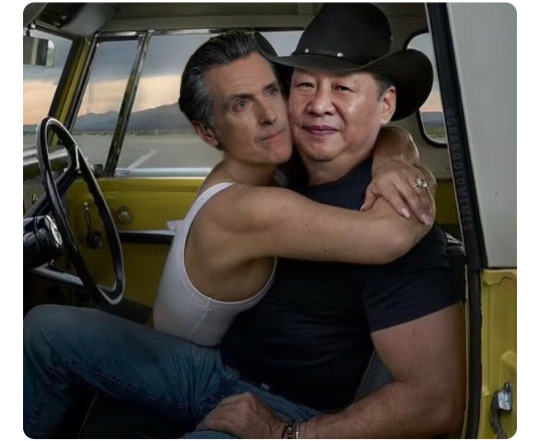
61 notes
·
View notes
Text

TIARA ALERT: Princess Sirivannavari of Thailand wore a gold floral tiara by Malakarn to receive heads of state attending the Asia-Pacific Economic Cooperation Summit at the Grand Palace in Bangkok on 18 November 2022.
341 notes
·
View notes
Text
What would you want to tell the next U.S. president? FP asked nine thinkers from around the world to write a letter with their advice for him or her.
Dear Americans,
You will soon go to the polls to elect your next president. And once again, the rest of the world will be holding its breath. I will be following the vote count with a mix of admiration, expectation, and concern: admiration for your democracy and its ability to reinvent itself even when faced with serious challenges; expectation because the United States is a model that we all want to follow; concern about your temptation to isolationism. In a nutshell, your choice matters to you and your future but also to millions of people around the world, including in Europe. I hope, therefore, you will not mind me humbly providing unsolicited advice.
Your biggest asset is trust: the faith you have in yourselves and your ability to overcome and the confidence that your friends and allies around the world place in you—the dynamism of your economy, your capacity to innovate and develop cutting-edge technologies, the strength of your defense sector, the checks and balances of your democracy, and your support for international cooperation to address collective challenges, from nuclear proliferation to climate change and from poverty eradication to pandemics.
But that trust has been severely dented in recent years. At home, some of you depict a nation in decline, portraying a scared mouse where we see a roaring lion. And these last years have seen a serious erosion in the trust that many around the world have in the United States, too. We have seen unilateralism and economic protectionism and have been confronted with a purely transactional approach from some of you, including in the sacrosanct sector of defense in NATO. We have seen the United States undermining the same multilateral system that it helped build.
It is time you double down on regaining the trust of your friends and allies. They will make you stronger and safer. Investing in developing the European pillar within NATO and cooperating on the defense industry with European nations will not only ensure that Europe takes responsibility for its defense, but it will also strengthen the United States to project its power globally, particularly in the Asia-Pacific. Joining hands in the decarbonization of the trans-Atlantic economy, as opposed to deploying unfair schemes against European companies, will help us all reduce our carbon emissions faster and provide greater benefits to our companies. Helping to craft global rules on digital trade at the World Trade Organization stands to benefit, first and foremost, U.S. tech giants operating worldwide. Taxing and regulating the tech sector as well as building guardrails for artificial intelligence will be more effective if done in concert and will also be fairer. Leading in the United Nations or in international institutions on issues such as financing the green transition in developing countries will help stabilize the economies of many of your friends and neighbors. When they do better, the United States benefits, too. In a world more intertwined than ever before, isolationism doesn’t protect. Disengaging from Ukraine sends a message not just to Russia; China reads it, too. Disengaging from NATO is heard not just in Brussels; it is felt in the Philippines, South Korea, and Japan as well as the Middle East.
And the denting of U.S. democracy is not just an issue in Washington; it resonates across Europe, too. Your biggest weakness is your democracy and open society. I say weakness not because I would wish for an authoritarian America but because openness makes you—as well as us—more susceptible to disinformation and manipulation. As in much of Europe, democracy in the United States faces challenges of election interference, growing polarization, threats against journalists, and the spread of manipulative information. AI has helped magnify this challenge with the exponential capacity to develop lifelike fakes aimed at misleading citizens. The enemy is within, and it is very good at finding like-minded allies across Europe. But foreign interference abounds as well.
It is worth investing in a shield that would protect and preserve democracy for future generations. This will require a combination of measures including bolstering cybersecurity; regulating social media platforms and introducing transparency in algorithms; providing warnings and counterarguments for misinformation before citizens face it; and strengthening U.S. election systems, including election certification processes and protecting the right to vote. Ultimately, it is about empowering each and every citizen to serve as a custodian of democracy. Democratic forces in Europe and in the United States could benefit from joining hands and sharing experiences.
You have in your hands the decision about who will be the next president of the United States. As you prepare to vote, Europeans will start a new political cycle, too, with a recently elected European Parliament voting on the program of work to be led by the European Commission. The uncertainty around us has made us realize that our destiny will be shaped by what we do next. We are determined to protect our democracy, step up our defense, and bolster our prosperity for the benefit of all citizens. We know the task is daunting, and we will have to show strong determination and unity to meet it. I am confident we will. But I also know that we will both be stronger if we trust and respect each other, if we work hand in hand to protect our democracies, and if we can still count on the United States as our ally.
Arancha González is the dean of Sciences Po’s Paris School of International Affairs and a former Spanish foreign minister.
9 notes
·
View notes
Text
South Korean President Yoon Suk-yeol Attends APEC Leaders’ Dinner
South Korean President Yoon Suk-yeol and First Lady Kim Gun-hee graced the Asia-Pacific Economic Cooperation (APEC) leaders’ dinner in San Francisco on November 16, as reported by Kim Eun-hye, the presidential press secretary. The APEC dinner, hosted in the illustrious Legion of Honor museum, was a galaxy of world leaders and their spouses, all gathered around a long table, broaching matters of international intrigue and camaraderie.
------
Post-Dinner Interactions
After the dinner, First Lady Kim congratulated President Boluarte on Peru’s upcoming chairmanship of APEC and received an invitation to visit Peru next year. The cultural exchange continued as American actor Darren Criss greeted President Yoon and the First Lady in Korean, expressing his gratitude.
20 notes
·
View notes
Text
the San Francisco Bay Bridge was blocked by over 200 protesters today (11.16.2023) who staged a "die-in" by laying under white sheets & blockading the bridge (which normally sees 260,000 vehicles crossing daily — more now as the city hosts the Asia Pacific Economic Cooperation forum).
#palestine#free palestine#apparently people were like... throwing their car keys over the bridge? no source for this#there were stop genocide banners & calls for a ceasefire
22 notes
·
View notes